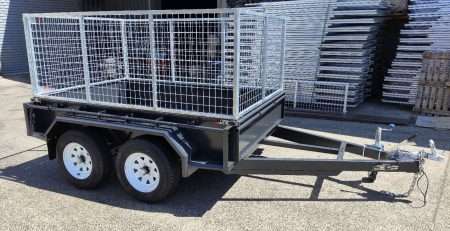
Redefining Mobility: Car Carrier Rental Services Unveiled
Car Carrier Rental: An Overview
Before delving into the specifics of car carrier rental, it’s important to understand what it entails and the benefits it offers.
What is car carrier rental?
Car carrier rental refers to the process of renting a specialised trailer or transport vehicle designed for transporting vehicles from one location to another. It provides a convenient and cost-effective solution for individuals or businesses that need to transport multiple vehicles (Montway). With a car carrier rental, you can tow your car behind a moving truck, allowing for efficient transportation.
Car carrier rentals are commonly used for various purposes, such as moving long distances, relocating vehicles for events, or transporting vehicles for business purposes. They offer a practical alternative to driving multiple vehicles individually, saving time and effort.
Benefits of Car Carrier Rental
Car carrier rental offers several benefits for those in need of vehicle transportation. Here are some key advantages:
- Cost-effective: Renting a car carrier can be a cost-effective option compared to other methods, such as hiring a car carrier service or shipping vehicles individually (Montway). It allows you to transport multiple vehicles at once, reducing overall transportation costs.
- Convenience: Renting a car carrier trailer provides convenience, especially when moving long distances or transporting vehicles for events. You can easily tow your car behind a moving truck, eliminating the need for separate drivers or additional logistics (Moving.com).
- Flexibility: Car carrier rental provides flexibility in terms of timing and location. You can choose the rental duration that suits your needs, whether it’s a short-term rental for a specific event or a longer rental for extended transportation needs. Additionally, car carrier rentals are available at various locations, making it convenient to pick up and drop off the equipment.
- Control: With a car carrier rental, you have control over the transportation process. You can determine the routes, stops, and schedule according to your preferences, ensuring that your vehicles are transported safely and efficiently.
When considering car carrier rental, it’s important to evaluate factors such as the cost of rental, requirements for renting, and inspecting the car carrier. By understanding these factors, you can make an informed decision and choose the right car carrier rental option for your specific needs.
Factors to Consider for Car Carrier Rental
When considering car carrier rental, there are several important factors to take into account. These include the cost of car carrier rental, the requirements for renting a car carrier, and the inspection process for ensuring the car carrier’s suitability.
Cost of Car Carrier Rental
The cost of car carrier rental can vary depending on factors such as the duration of the rental, the distance travelled, and the type of carrier used. Prices may also vary between different rental companies. It is advisable to obtain quotes from multiple providers to ensure you are getting the best possible price for your specific needs.
| Car Carrier Rental Type | Average Cost |
|---|---|
| Car Carrier Trailer | $50-$200 per day (Moving.com) |
Please note that the table only provides a general idea of the cost range and specific prices may vary.
Requirements for Renting a Car Carrier
When renting a car carrier, rental companies typically have specific requirements that must be met. These requirements may include:
- Minimum age: Renters are generally required to be at least 25 years old to rent a car carrier (Montway).
- Valid driver’s licence: Renters must possess a valid driver’s licence.
- Proof of insurance: Some rental companies may require renters to provide proof of insurance coverage.
- Security deposit: Renters may be asked to provide a security deposit, which can vary depending on the company and the value of the trailer (Moving.com).
It is important to check with the specific rental company for their requirements and ensure that you meet all necessary criteria before proceeding with the rental process.
Inspecting the Carrier
Before finalising the rental agreement, it is crucial to thoroughly inspect the car carrier to ensure it is in good condition and properly equipped for transporting vehicles. Some key aspects to consider during the inspection include:
- Structural integrity: Check for any signs of damage or wear that could compromise the safety of the carrier.
- Towing capacity: Ensure that the car carrier’s towing capacity is compatible with the towing capacity of your vehicle.
- Secure tie-down points: Inspect the tie-down points and ensure they are secure and in good condition.
- Lighting and signals: Check that all lights and signals on the car carrier are functional to ensure safe transportation.
By conducting a thorough inspection, you can identify any potential issues and address them before embarking on your journey. This helps to ensure the smooth and safe transport of your vehicle.
Taking into account these factors, such as the cost of rental, requirements, and inspection process, will help you make an informed decision when renting a car carrier. Being well-prepared and knowledgeable about the rental process ensures a successful and hassle-free experience.
Types of Car Carriers for Rental
When considering car carrier rental, it’s important to understand the different types of car carriers available. Each type offers distinct features and benefits to accommodate various transportation needs. The three main types of car carriers for rental are open car carriers, enclosed car carriers, and multi-car carriers.
Open-Car Carriers
Open-car carriers are the most common type of car carrier used for transportation. These carriers can typically transport up to 10 vehicles at a time (source). Open-car carriers are cost-effective and practical for shipping vehicles in large quantities. They are suitable for transporting standard vehicles when cost is a primary concern.
One of the advantages of open-car carriers is their visibility. Since the vehicles are exposed during transport, it’s easier to inspect them visually, ensuring their condition throughout the journey. Additionally, open-car carriers offer the ability to easily load and unload vehicles, making the process more efficient.
Enclosed car carriers
For those seeking additional protection and security for their vehicles, enclosed car carriers are an excellent option. Enclosed car carriers provide a fully enclosed environment, shielding the vehicles from the elements and potential road debris during transportation (source). This makes them the top choice for high-value vehicles such as luxury, vintage, or custom vehicles.
Enclosed car carriers offer superior protection against weather conditions, preventing potential damage from rain, snow, or extreme temperatures. Furthermore, the reduced mileage adds to the appeal of enclosed car carriers. Instead of driving the vehicles to their destination, they are loaded onto the carrier, minimising wear and tear.
Multi-Car Carriers
Multi-car carriers, as the name suggests, are designed to transport multiple vehicles at once. These carriers are capable of carrying a larger number of vehicles, with some models able to transport up to 12 cars (source). Multi-car carriers are commonly used for transporting vehicles in bulk, making them a practical choice for dealerships or car rental companies.
The main advantage of multi-car carriers is their ability to transport a large number of vehicles efficiently. By consolidating multiple vehicles into a single carrier, transportation costs can be reduced. This type of carrier is typically used for standard vehicles that do not require the additional protection of enclosed carriers.
When choosing the right car carrier for your transportation needs, consider factors such as the type of vehicle being transported, the desired level of protection, and the budget. Open car carriers offer cost-effectiveness and practicality, while enclosed car carriers provide added security and protection for high-value vehicles. Multi-car carriers are suitable for bulk transportation of standard vehicles.
By understanding the different types of car carriers available for rental, you can make an informed decision based on your specific requirements and preferences.
Renting a Car Carrier from Penske
Penske, a trusted name in transportation services, offers convenient and reliable car carrier rentals for safely transporting vehicles during a move. Whether you’re relocating or need to transport a vehicle for any other reason, renting a car carrier from Penske can be an excellent solution.
Car carrier rentals from Penske
Penske provides car carriers that can be attached to their rental trucks, making it easy to transport your vehicle alongside your belongings. These car carriers are available for both one-way and round-trip moves, giving you flexibility in your transportation plans. With Penske, you can have peace of mind knowing that your vehicle will be transported safely and securely.
Features and Specifications of Penske Car Carriers
Penske’s car carriers are designed to accommodate various vehicles and provide a smooth and secure transport experience. Here are some key features and specifications of Penske car carriers:
- Weight Capacity: Penske car carriers have a weight capacity of up to 4,055 pounds, allowing for the transportation of a wide range of vehicles (Penske Truck Rental).
- Vehicle Size: The car carriers can accommodate vehicles up to 6,000 pounds and 20 feet long (Penske Truck Rental).
- Secure Tie-Downs: The car carriers are equipped with soft tie-downs that help secure the vehicles in place during transport, ensuring their safety and stability throughout the journey.
- One-Hand Release Ratchet: Penske’s car carriers feature a patented one-hand release ratchet system, making it convenient and easy to load and unload the vehicles.
How to Reserve a Car Carrier from Penske
Reserving a car carrier from Penske is a simple and straightforward process. You can reserve a car carrier rental online through their website or by calling Penske’s customer service. By providing your move details and rental preferences, you can secure a car carrier for your transportation needs.
Renting a car carrier from Penske allows you to transport your vehicle efficiently and reliably. With their expertise in transportation services and the quality of their equipment, you can trust Penske to provide a seamless experience for your vehicle transportation needs.
When considering renting a car carrier, it’s important to evaluate factors such as the cost, requirements for renting, and proper inspection of the car carrier. For more information on these factors, refer to the previous sections of this article.
Cost and Discounts for Car Carrier Rental
When considering car carrier rental, it’s essential to understand the associated costs and any potential discounts or promotions available. Here, we’ll explore the average cost of car carrier rental, deposits, and insurance requirements, as well as discounts and promotions offered by rental companies.
Average Cost of Car Carrier Rental
The cost of a car carrier rental can vary depending on several factors, including the duration of the rental, the distance travelled, and the type of carrier used. On average, renting a car carrier trailer can cost between $50 and $200 per day, depending on the size and type of trailer (Moving.com). It’s important to note that these prices are approximate and may vary based on location and rental company.
To get an accurate estimate of the cost, it’s recommended to reach out to car rental companies directly. They can provide detailed pricing information based on your specific requirements, including the duration of the rental and any additional services you may need. Additionally, you can also explore options for long-term rentals, as they may offer more cost-effective solutions for extended periods.
Deposits and Insurance for Car Carrier Rental
Some car rental companies may require a deposit to secure the rental. The deposit amount can range from $100 to $500, depending on the company and the value of the trailer (Moving.com). It’s important to enquire about the deposit policy when making a reservation.
It’s crucial to comprehend the insurance coverage that the rental company offers in this regard. They may offer insurance options to protect against damage or theft during the rental period. Review the terms and conditions of the rental agreement to determine the level of insurance coverage included and if additional insurance is necessary. You may also consider checking with your personal auto insurance provider to see if your policy covers rented trailers.
Discounts and Promotions for Car Carrier Rental
To attract customers, many car rental companies offer discounts or promotions. These can vary depending on the rental company and the specific rental period. Common discounts include a free day of rental or a percentage off the total cost. These offers can help reduce the overall expense of renting a car carrier trailer. It’s recommended to enquire about any available discounts or promotions when making a reservation with the rental company. They can provide information on current offers and eligibility requirements.
By understanding the average cost of car carrier rental, deposit and insurance requirements, as well as potential discounts and promotions, you can make an informed decision when choosing a rental company. Remember to consider factors such as the duration of the rental, the distance travelled, and any additional services required to select the option that best fits your needs and budget.
Choosing the Right Carrier
When it comes to choosing a car carrier for your transportation needs, there are several factors to consider. The type of car carrier you select will depend on your requirements, your budget, and the level of protection you desire for your vehicle. In this section, we will explore the factors to consider when choosing a car carrier, as well as the pros and cons of open car carriers and enclosed car carriers.
Factors to Consider in Choosing a Carrier
When selecting a car carrier, it’s important to keep the following factors in mind:
- Type of Vehicle: Consider the size, value, and condition of your vehicle. Different car carriers may be better suited for specific types of vehicles, such as standard cars, luxury vehicles, or vintage cars.
- Budget: Determine your budget for car transportation. Different types of car carriers have varying costs associated with them, so it’s essential to establish a budget that aligns with your financial considerations.
- Level of Protection: Evaluate the level of protection you require for your vehicle during transportation. If you have a high-value vehicle or want to minimise exposure to the elements, you may prefer an enclosed car carrier.
- Number of Vehicles: Consider the number of vehicles you need to transport. Open car carriers are more cost-effective and practical for shipping multiple vehicles at once, while enclosed car carriers typically transport fewer vehicles.
Open Car Carriers: Pros and Cons
Open-car carriers are a popular choice for transporting vehicles in large quantities. They are cost-effective and practical, making them suitable for standard vehicles and scenarios where cost is a primary concern. Some of the pros and cons of open-car carriers include:
Pros:
- Cost-effective option for shipping multiple vehicles.
- Increased visibility and easy inspection of vehicles during transit.
- Suitable for standard vehicles and when cost is a primary consideration.
Cons:
- Vehicles are exposed to the elements, which may result in dirt, dust, or debris accumulation.
- Limited protection from road hazards, such as rocks or flying debris.
- Not recommended for high-value or luxury vehicles that require enhanced protection.
Enclosed Car Carriers: Pros and Cons
Enclosed car carriers provide superior protection and are the preferred choice for high-value vehicles, including luxury, vintage, or custom vehicles. They offer reduced mileage since the vehicles are loaded onto the carrier and not driven. Consider the following pros and cons of enclosed car carriers:
Pros:
- Enhanced protection from the elements, including dirt, dust, and weather conditions.
- Reduced risk of road hazards, such as rocks or debris.
- Ideal for high-value vehicles that require maximum protection and security.
Cons:
- Higher cost compared to open-car carriers.
- Typically transport fewer vehicles, so availability may be limited.
- Limited visibility and inspection during transit.
By considering these factors and weighing the pros and cons of open car carriers and enclosed car carriers, you can make an informed decision about the best car carrier for your needs. Remember to assess your budget, the level of protection required, and the specific characteristics of your vehicle to ensure a smooth and successful transportation experience.
Renting a car vs. shipping a car for long-distance travel
When planning a long-distance journey, individuals often face the decision of whether to rent a car or ship their own vehicle. Each option has its own set of advantages and considerations. Let’s explore the pros and cons of both renting a car and shipping a car, as well as the factors to consider in making this decision.
Pros and Cons of Renting a Car
Renting a car for long-distance travel can offer several benefits. One of the key advantages is convenience. By opting to rent a car, individuals can choose a vehicle that suits their specific needs and preferences. This includes selecting the type of car, size, and features that will enhance their journey.
Renting a car also provides flexibility. If the trip involves different destinations or a one-way journey, renting allows for easy drop-off at a different location. It eliminates the need to return to the starting point to retrieve the vehicle.
However, there are some considerations when it comes to renting a car. Cost can be a factor, especially for extended trips. Rental fees, insurance, and additional charges such as fuel and mileage can add up, impacting the overall budget. It’s important to carefully evaluate the cost-effectiveness of renting a car for the desired duration of the journey.
Pros and Cons of Shipping a Car
Shipping a car offers its own set of advantages for long-distance travel. One major benefit is time savings. Rather than spending hours or even days driving to the destination, shipping a car allows individuals to fly or take alternative transportation, reaching their destination quickly.
Another advantage is convenience. Shipping a car eliminates the need to plan for rest stops, overnight stays, or potential vehicle breakdowns during the journey. It also ensures that the vehicle arrives in good condition, without the wear and tear associated with long-distance driving.
However, there are considerations when it comes to shipping a car. Cost is a significant factor, especially for shorter trips. Shipping a car can be more expensive compared to renting, particularly if the distance is not substantial. It’s important to evaluate the cost-effectiveness of shipping a car based on the specific journey’s distance and duration.
Factors to Consider in the Decision
When deciding between renting a car and shipping a car for long-distance travel, several factors should be taken into account. These include:
- Distance: Consider the distance of the journey. For shorter distances, renting a car may be more cost-effective, while shipping a car may be more practical for longer distances.
- Duration: Evaluate the duration of the trip. Renting a car can provide flexibility for shorter trips, while shipping a car may be preferable for longer journeys.
- Budget: Assess your budget and determine which option aligns with your financial resources. Consider the cost of rental fees, insurance, fuel, mileage, and shipping charges.
- Personal Preferences: Consider your personal preferences and comfort. Some individuals may prefer the convenience and familiarity of their own vehicle, while others may enjoy the variety and flexibility of renting.
- Specific Needs: Evaluate your specific needs for the journey. If you require a specific type of vehicle or have special requirements, renting a car may better meet those needs.
By carefully considering these factors, you can make an informed decision about whether to rent a car or ship your own vehicle for long-distance travel. Remember to weigh the pros and cons of each option and choose the one that best fits your circumstances, budget, and preferences.
Author
I am Rahatul Ashiq Tamal. Another author of Muscle Trailers. Muscle Trailers is a well-known trailer brand in Sydney, Melbourne & Adelaide

How to Mount a Spare Tire on Your Trailer: A Simple Step-by-Step Guide
Trailer service centers receive over 1 million phone calls and 1.3 million emails each year about trailer maintenance problems....

How to Fix RV Roof Leaks: Simple Roof Leak Detection Guide for Beginners
Did you know DIY RV roof repairs can cost under $50? But undetected leaks could lead to substantially higher repair...

Starting a Food Truck Business in Australia: From Trailer Selection to Launch
The Australian mobile food market has evolved into a billion-dollar industry. This makes a food truck...
